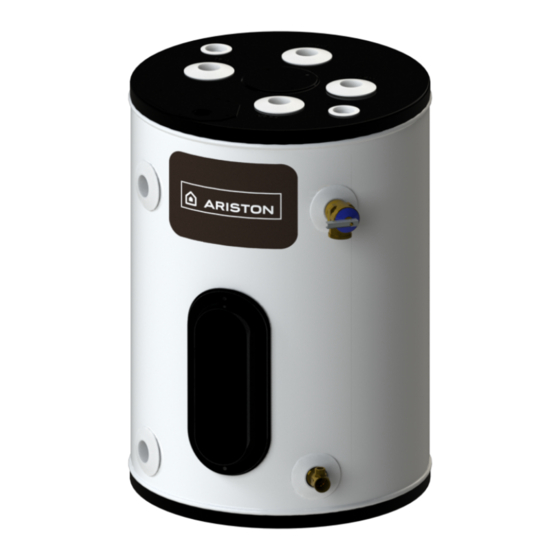Ariston ARI POU-20 Handbuch für Gebrauch und Pflege - Seite 12
Blättern Sie online oder laden Sie pdf Handbuch für Gebrauch und Pflege für Warmwasserbereiter Ariston ARI POU-20 herunter. Ariston ARI POU-20 19 Seiten. Electric water heater

12
Part 6 - Operation
Tank must be full of water before the power is turned on. The heating
element will be damaged if energized for even a short time while
tank is dry. Failures due to "dry-firing" ARE NOT covered by warranty.
After water and electrical connections have been made and tank is
filled with water, turn on power to the heater. The heater is now in
operation.
A. Combination Thermostat and High Limit Control (ECO)
Each water heater is equipped with a combination Thermostat - High
Limit Control (ECO). The thermostat is located above the heating
element. If for any reason the water temperature becomes excessively
high, the ECO breaks the circuit to the heating element. Once the
switch opens it must be reset manually. However, THE CAUSE OF THE
OVER TEMPERATURE CONDITION MUST BE CORRECTED FIRST.
The cause of the high temperature condition must be investigated
by a qualified service technician and corrective action must be taken
BEFORE placing the water heater back in service. Failure to do so
could result in property damage, severe personal injury, or death.
B. Thermostat Adjustment and ECO Reset
There is one thermostat on single element heaters. If temperature
adjustment is necessary, TURN OFF POWER TO HEATER, and remove
the access cover. The thermostat protective cover SHOULD NOT be
removed. Set temperature indicator to desired temperature. Replace
the access cover. Turn on power to the heater.
Failure to disconnect the power from the water heater before
attempting to adjust or reset the thermostat( will result in property
damage, severe personal injury, or death.
IF YOU NEED TO ADJUST THERMOSTATS OR RESET THE ECO (RED
RESET BUTTON)
STEP #1 - Turn off power to
the water heater by removing
fuse or shutting off at circuit
breaker.
STEP #2
-
Remove
the
access cover. To expose the
thermostat.
STEP #3 - See Figure 6
a. Reset the ECO by pushing
in the red button marked
"RESET".
b. Use a small flat head
screwdriver to adjust the
water
temperature
by
turning
to
the
desired
temperature.
Step #4 - Reinstall the access
cover.
lp-772 Rev. 000 Rel. 000 Date 3.17.21
Figure 6 - Thermostat Detail
Step #5 - Restore power by
replacing the fuse or turning
on the circuit breaker.
Step #6 -
a. After resetting the ECO,
ensure the water heater is
operating properly before
leaving the installation.
b. After adjusting the water
temperature, allow the water
heater enough time to heat
the water to temperature.
After the water heater has
stopped heating, measure
the water temperature at
a hot water outlet in the
structure.
Step #7 - If the water heater
is operating properly and
the water temperature is
satisfactory,
adjustment
is
complete.
Risk of scald injury increases as you increase water temperature.
Failure to reinstall the access cover could result in property
damage, severe personal injury, or death.
C. Heating Element Replacement Procedure
If the heating element needs replacement, it is very important to
use the same voltage, wattage, and construction. DO NOT replace
the heating element with a generic heating element. Only Ariston
heating elements are approved for use with this water heater.
Failure to follow this warning will result in premature product
failure and VOID the warranty, and could result in severe personal
injury or death.
STEP #1 - Turn off power to the water heater. Use a Phillips Head
screwdriver to remove the wires from the element.
Failure to disconnect the power from the water heater before
attempting heating element replacement will result in property
damage, severe personal injury, or death due to electric shock.
STEP #2 - Run hot water at a faucet in the system. When it runs cold,
shut off the faucet. Then shut off water at the main cold water inlet
or, if possible, valve off the water heater from the system. Drain the
water from the system, or just the water heater if it can be isolated
from the system.
